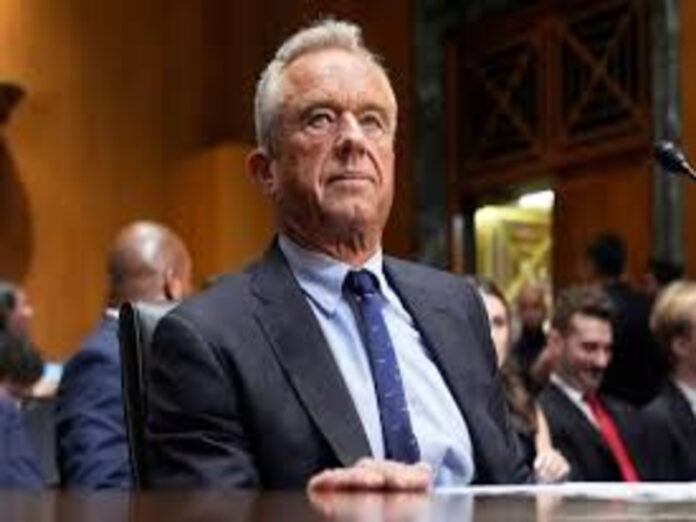Supporters argue bold reform; critics warn of dangerous distrust.
Sunday, September 7, 2025, 2:30 P.M. ET. 5 Minute Read, Opinion, By Jennifer Hodges: Englebrook Independent News,
WASHINGTON, DC.- When Robert F. Kennedy Jr. walked into the Senate Finance Committee hearing on Thursday, the room was already buzzing. He wasn’t just another Cabinet official defending budget lines or policy tweaks. He was a lightning rod—facing senators from both parties, health experts, and a public still scarred by the failures of America’s pandemic response. What emerged was a portrait of a leader determined to break the mold, and just as determined to divide the country while doing so.
At the heart of the debate is not only Kennedy’s leadership but the question of whether the nation’s health system can withstand his disruptive style.
The Case for Kennedy: Breaking the Mold;
Kennedy’s supporters argue he is saying out loud what millions of Americans already feel: that the CDC and HHS lost public trust years ago, and tinkering at the margins won’t fix it.
- Calling Out Bureaucratic Failure
Kennedy bluntly described the CDC as a “captured agency” that is more loyal to pharmaceutical companies than to the public. While hyperbolic, the charge resonates. From botched COVID test rollouts to muddled mask messaging, the CDC often looked more like a bureaucracy chasing its tail than the world’s premier public health agency. - Cleaning House at CDC and ACIP
Kennedy’s wholesale firing of CDC leadership and dismissal of the Advisory Committee on Immunization Practices was framed as an attack on entrenched interests. He argued that a house so compromised by conflicts of interest needed to be gutted before it could be rebuilt. Even critics admit the move was bold. - Broadening the Health Agenda
Through his “Make America Healthy Again” initiative, Kennedy has elevated issues like childhood chronic disease, mental health, and nutrition—areas where federal leadership has long been timid. His backers say this reflects a broader vision: shifting health policy from reactive treatment to prevention and wellness.
The Case Against Kennedy: Chaos in the Making;
But the very qualities his supporters admire are what his critics find most dangerous.
- Vaccine Policy in Disarray
During the hearing, senators grilled Kennedy over new vaccine policies that have already caused confusion across states. Restricting access to COVID-19 boosters without a clear scientific rationale undermines decades of progress in public health. Hospitals and providers are left guessing, and ordinary Americans pay the price in uncertainty. - Misinformation at the Top
Fact-checkers pounced on Kennedy’s testimony, noting his reliance on debunked claims about vaccine safety and inflated figures on adverse events. For scientists, it is one thing when such rhetoric spreads online; it is quite another when it comes from the top health official in the country. - Bipartisan Alarm Bells
Thursday’s hearing revealed rare consensus. Democrats hammered him for “reckless disregard for science,” while several Republicans voiced unease about the chaos his policies are creating. Over 1,000 current and former HHS staff have called for his resignation. Even some of Donald Trump’s own allies have begun to distance themselves. - Conflicts of Interest Misrepresented
Kennedy accused the CDC’s vaccine advisory panel of being riddled with conflicts. In reality, watchdog groups and fact-checkers note that financial conflicts are at near-historic lows, with most issues involving minor paperwork delays. By exaggerating the problem, critics argue, Kennedy undermines trust without offering a viable replacement.
Why Reform Is Still Urgent;
None of these excuses the CDC’s failures. If Kennedy is wrong in diagnosis or cure, he is not wrong in recognizing the sickness.
The CDC stumbled during the COVID-19 pandemic, rolling out faulty tests that delayed the nation’s response at a critical early stage. Guidance on masking and school closures swung with political winds, leaving the public confused and angry. Internal reviews revealed a bureaucracy too slow to adapt, too cautious to innovate, and too compromised by outdated systems.
Trust in public health declined significantly during this period, and polling indicates that it has yet to recover. Many Americans now view the CDC less as an independent guardian of science than as an arm of whichever political party controls Washington. Reform is not optional—it is essential.
The question is whether Kennedy’s sledgehammer approach can produce renewal, or whether it will only deepen the fractures.
An Open-Ended Verdict;
Robert F. Kennedy Jr.’s Senate hearing crystallized the stakes.
- To his allies, he is a truth-teller willing to confront the sacred cows of public health, someone who sees the failures of the past and refuses to repeat them.
- To his critics, he is reckless, dismissive of science, and likely to erode what little trust remains in America’s health institutions.
What no one disputes is the need for change. The CDC cannot return to business as usual after COVID-19. Whether Kennedy is the man to lead that transformation—or the accelerant of a more profound crisis—remains unanswered.
For now, the country is left with a gamble: Is bold disruption the cure, or just another symptom of a system in decay?
What Comes Next?
The real test will not be Kennedy’s fiery testimony but the policies that follow. Will his reforms streamline a sluggish CDC and rebuild trust through transparency, or will they sow confusion and division in an already fragile system? Senators are already signaling tighter oversight, governors are bracing for funding battles, and hospitals are scrambling to adjust to new vaccine guidance. In the coming months, Americans will see whether Kennedy’s shake-up delivers genuine reform or whether it leaves the nation’s public health infrastructure weaker than ever.
Editor’s Note: This op-ed reflects on Robert F. Kennedy Jr.’s Senate hearing, weighing the potential benefits and risks of his leadership at HHS. It acknowledges the CDC’s real need for reform while leaving the ultimate verdict to readers.
